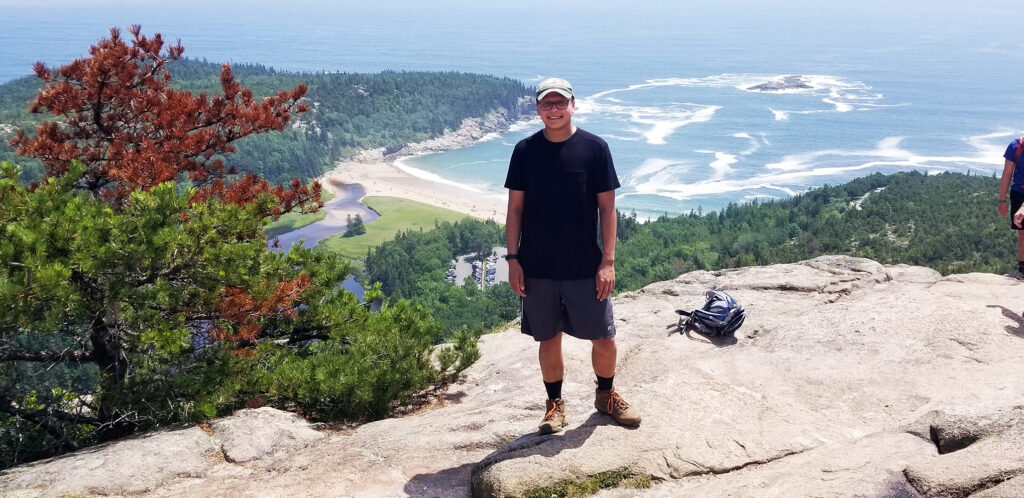
After he graduates from NC State University, Nikhil Milind ’21 will head to Stanford University to pursue a Ph.D. in genetics as a National Science Foundation Graduate Research Fellow. The five-year fellowship provides three years of financial support including an annual stipend of $34,000 and a cost of education allowance of $12,000. Milind worked with NC State’s University Fellowships Office to apply for the fellowship and spoke with them about his experience.
Tell us more about your research.
At NC State, I have been working with Dr. David Aylor in the Department of Biological Sciences. Dr. Aylor is interested in bioinformatic approaches to research in epigenetics and quantitative genetics. In recent years, scientists have developed mouse populations that are genetically diverse and replicable across labs. These genetic reference populations (GRPs) promise replicability of scientific results. Furthermore, consistent genetic panels should theoretically allow us to answer higher-order biological questions by combining data across multiple studies.
What inspires you?
First and foremost, I have to thank my research mentors for giving me the opportunity to conduct research and inspiring me to pursue a career in the sciences. Dr. Janardhan at the National Institute of Environmental Health Sciences provided me with my very first experience with research. Dr. Iweala at the UNC Allergy and Immunology Clinic inspired me to conduct research that was clinical and patient-oriented to better the lives of others. Dr. Carter at the Jackson Laboratory has been instrumental in my choice of future research in the field of human genetics, specifically within the realm of complex diseases. Dr. Aylor at NC State has given me an appreciation for studying the genetic architecture of complex traits and mentored me throughout my four years at NC State.
These mentors provided me with much-needed guidance, inspiration, motivation, and vision. My ultimate inspiration to pursue science is the service I can provide to my community. I hope to identify therapeutic targets for complex diseases that have proven to be intractable, such as Alzheimer’s disease, asthma, or diabetes. I hope that I will be able to better the lives of others!
What have you learned about yourself during the process of applying for this fellowship?
I have learned a lot through this process! I have realized, for instance, that my vision for the future of the biomedical field is an era of precision medicine. Due to the increasingly large biological and genomic data that we can collect from human cohorts, we are better able to identify subsets of patients within diseases categories. This dissection of complex systems will, in my opinion, herald a new era of therapeutic development.
I have also learned that I really value service to my community. One of the reasons I chose Stanford for my graduate education is that they require community service as a part of the graduation requirements. I believe that a strong culture of service will strengthen the program and connect future scientists with the community that they serve. I hope to continue serving various organizations on campus and in the area around Stanford over the next few years!
Now that you’ve gone through this process twice, what advice do you have for students looking to get involved with fellowships?
If you are applying for fellowships at NC State, I would definitely recommend reaching out to the University Fellowships Office! Their support and guidance was instrumental in my decision to apply for fellowships.
In my opinion, one of the most important aspects of getting involved with fellowships is your mindset going into the process. When I started looking at fellowships, I had a vision about what I wanted to do in the future. I knew that the chances of getting any one fellowship were low. Thus, I looked at each application as a way to refine my vision for the future. In the end, regardless of whether a fellowship chooses to support you, each application process will further refine your goals and clarify your aspirations. It was no surprise to me that I did not hear back positively from most of the fellowships I applied for. However, each successive application cycle has helped me understand the impact I want to have in the future.
Drawing from this, I would recommend that all students interested in fellowships should apply far and wide! Each application will strengthen your vision for the future. Each of the fellowship applications I completed made it that much easier to write my graduate school personal statements. You may also want to apply to fellowships that are slightly outside your comfort zone. In my experience, they tend to reveal new facets of your motivations and character.
This interview was originally published in the University Fellowships Office’s monthly newsletter.
The University Fellowships Office helps NC State undergraduate students, graduate students, and alumni learn about and apply for nationally competitive and prestigious awards. These awards fund a wide range of opportunities, and many are connected to undergraduate and graduate degree programs or internships, overseas opportunities, and independent projects. Contact fellowship-advising@ncsu.edu for more information.